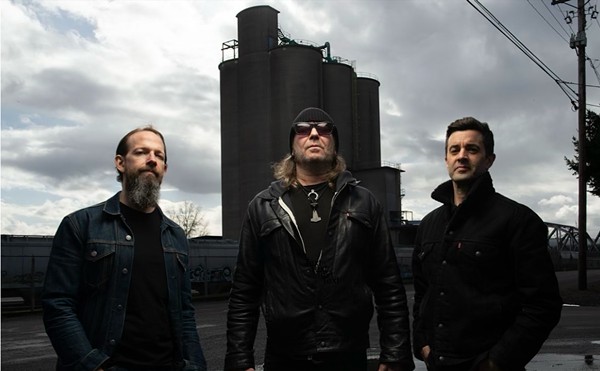Premiers Symptomes
(Astralwerks)
Premiers Symptomes, the new seven-track EP collection from French electronic cheese-wiz duo Air, explores the group's pre-Moon Safari days. And while the initial shrug may be one of indifference for this stopgap between albums, the fact is that parts of Premiers Symptomes actually rival Moon Safari in terms of both songcraft and spacey vibe. At the very least, they certainly lay out the blueprint for Air's neoclassic slice of digital cheesecake.
Last year's Moon Safari was part retro gazing, part new-age clubbing. Between double takes of modern dance technique and songs that sounded like soundtracks to lost '60s French new-wave films, Air molded Moon Safari into something that was bigger than its modest package let on (indeed, Air fills the stage with more equipment than your average mainstream rock act when it plays live). It steamrolled into electronic music's collective conscious, effectively hoisting a benchmark for its contemporaries to reach. Premiers Symptomes comes close, dipping into a bag of tricks that manages to sound quite new -- quite a feat, considering the tracks here preceded Moon Safari's.
Gathering singles that were released between 1995 and early 1998, Air's Jean Benoit Dunckel and Nicolas Godin deliver a primer on all things French, electronic, and cheeky. Lounge jazz collides with synth noodlings, as Bacharachian horns merge with lo-fi rhythm machines. And in this post-ironic age, there's genuine heart running through Premiers Symptomes. Dunckel and Godin align themselves within the culture, and the soul, of the music they play. They're not great pretenders. When they quote a radio-ready '70s R&B riff deep inside an airy space investigation, nary a smirk can be sensed.
Since no one bought this stuff the first time around anyway, Premiers Symptomes's claim that two rare tracks are included doesn't mean much. This is essentially all fresh material. Even the oldest cut here, the deft "Modular Mix," which dates back to 1995, sounds years, or at least trends, ahead of other knob doctors' operations. And when Air gets all misty on "Le Soleil Est Pres de Moi," you'd swear they were building the blocks of their own mini-revolution. -- Michael Gallucci
Ralph Carney
I Like You (A Lot)
Byrdman/Akron Cracker
Multi-instrumental improviser Ralph Carney can be considered among the most distinctive voices to come out of Northeastern Ohio. An Akron native, he emerged at about the same time as Devo and the Pretenders. After playing with the local band Tin Huey, Carney moved to New York, where he was part of the B-52's, then hooked up with Tom Waits, in whose band he's played saxophone and clarinet for years.
Now based in San Francisco, Carney hasn't forgotten his roots, as the name of his record label indicates. He's most proficient on reeds but has to be one of the quickest musicians in the world. He can, as he demonstrates on this album, play just about any instrument you lay in front of him with some degree of competence -- brass, woodwind, keyboards, plucked and bowed stringed instruments, and percussion. And during live performances, he'll often play a couple of them at once.
If you think Carney has something in common with Rahsaan Roland Kirk, Sun Ra, and Moondog, you're right. He makes virtually every sound on this CD himself and puts them together by overdubbing. Carney's strength is that he blends tone colors and textures and genres like no one else. On "Fun House," which has the flavor of amusement park or circus sounds, Carney plays ukulele and harmonica, and sings (there's some voice processing here).
Don Redman's early 1930s "modernistic" piece "Chant of the Weed" is played by a reed section. "Miles's Corner" has a fusion influence, with Carney playing trumpet with a wah-wah pedal and Fender Rhodes piano. The Near Eastern-flavored "Far Out" finds him on oud as well as clarinet. On "Death Don't Come Easy" he employs a Tibetan funeral horn and bass trombone, and during "Dirge Part 2" he attempts to create the sound of a Chinese funeral band.
Carney's uninhibited sense of humor infuses these tracks, and looked at collectively, they constitute a fascinating sound mosaic. -- Harvey Pekar
Sting
Brand New World
(A&M)
Sting's pissed, and his wrath seems to know no boundaries. He's pissed at a former lover, pissed at that former lover's new boyfriend, pissed at the mailman, and pissed at those who scorn prostitutes. And while the lauded Police frontman's sixth solo album bears an optimistic title and mines the same wispy, ballad-oriented territory he perfected in the late '80s and early '90s, the hopeful strains of Brand New World, his first studio release in three years, lie concealed under curtains of caution and contempt.
The album opener "A Thousand Years" sums it up well enough, as Sting obsesses over "the single haunted memory of your face." That face compels Sting, who's backed by Stevie Wonder, Branford Marsalis, and James Taylor on this outing, to some rather bizarre activity. On "Big Lie Small World," he writes his former beloved a smug letter, only to reconsider, chase the postman down, and punch him out in an attempt to get it back. "Perfect Love . . . Gone Wrong," obvious enough in title alone, further pushes the envelope with Sting's malicious musings. "I'd like to put him in a casket," he remarks of the mythic new boyfriend. "I'll wear my best collar to his funeral." Oh, Sting. Behave.
To be fair, "Desert Rose" is the sweetest five minutes you'll ever hear from Sting. It's got a driving meditative groove with a nice faux-Middle Eastern vibe -- consider it Yanni for people who hate Yanni. The remaining tracks follow suit, with the usual quotient of sweeping orchestration, resonant melodies, and lyrical introspection. For variety's sake, "Fill Her Up" features a full choir preaching about fillin' your heart up with Jesus. Sting gets away with embracing all that pompadour with his literate and liberating words -- he's a poet and balladeer of the highest order who strikes a fittingly beautiful chord on Brand New Day, while still retaining his title as King of Pain. -- Rob Harvilla












